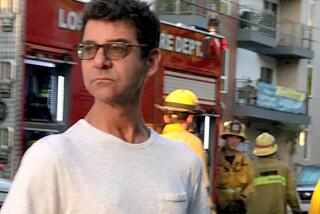Trial Begins in Camarillo Office Killing
- Share via
It had been months since his layoff and still Mikhail Khaimchayev’s urgent requests to be rehired as a computer programmer fell on deaf ears. So he went to confront the boss at his old Camarillo office, and he took along a gun.
An Uzbek immigrant, Khaimchayev had stuffed into his pocket a note, written in Russian.
“These creatures did not want to step in my shoes,” the note read. “In this country, they promise much but they don’t give anything.”
Khaimchayev, 31, fatally shot the company’s co-owner, Sheldon Snyder, nine times before wounding himself. On trial on a first-degree murder charge in Ventura County Superior Court, he faces a maximum sentence of 50 years to life in prison.
Prosecutors say Khaimchayev was still upset about losing his job when he strode into Postal Innovations Inc. on Jan. 13, 1999. After the shooting, he immediately told employees he did it because of the company’s repeated refusal to take him back, Deputy Dist. Atty. Bob Calvert said during opening statements Wednesday.
Deputy Public Defender Howard Asher acknowledged that his client shot Snyder but objected to the charges against him. He said first-degree murder requires forming an intent to kill, but Khaimchayev’s serious psychological problems prevented him from doing so. He urged jurors to consider a lesser charge of second-degree murder.
Khaimchayev, who lived in Hollywood, started working at Postal Innovations in April 1998 on a three-month probationary period. He made $25 an hour as an entry-level computer programmer for the company, which develops software for the postal service. But before his contract expired, Khaimchayev was told there was no more work for him and he was let go.
Supervisors testified in court that Khaimchayev was an eager employee with a good attitude, always arriving early and wanting to please his superiors. But they said his computer skills were weak, even though he had graduated from both a Russian university and a Los Angeles trade school.
“We just hit a wall and couldn’t go any further,” said Michael Martin, who supervised Khaimchayev’s work. “We just ran out of things for him to do without a programmer with him the whole time.”
They also said Khaimchayev couldn’t speak English well. He and his family had immigrated to the United States in 1996. Martin said Khaimchayev took the news about losing his job very calmly.
After he was released, Postal Innovations twice placed newspaper advertisements seeking a programmer. Khaimchayev called and said he wanted to come back, but a former supervisor told him they couldn’t hire him and gave him suggestions on how to improve.
On the afternoon of Jan. 13, 1999, Khaimchayev called Postal Innovations, asking for Snyder, and showed up about an hour later, office manager Sandra Strecker testified Wednesday. When he arrived, he greeted her before rushing down the hallway. Then she heard shouting and gunshots.
Snyder was lying on his stomach and not breathing when police arrived. Khaimchayev was nearby, bleeding from a self-inflicted shot to his abdomen. He spent several weeks in the hospital recovering. Snyder was pronounced dead at the scene.
During his opening statement, Calvert read the translated letter, which was titled “Why.” In it, Khaimchayev said Postal Innovations “unceremoniously” broke the contract, even though the company knew how hard he worked.
“Farewell, Sheldon and those like him,” the note read. “They forced me to do this.”
Defense attorney Asher said the letter “speaks volumes” about Khaimchayev’s mental problems, which he said include the inability to make judgments and react maturely to everyday stresses. Asher said his client felt that Postal Innovations was the only place he could work, and his life would be destroyed if he couldn’t get rehired.
“He honestly felt they were responsible for his failure to build a life for himself and his family in America,” Asher said during his opening statement.
Khaimchayev sat hunched over during the trial, listening on headphones to a Russian interpretation of the proceedings.
In July 1999, Khaimchayev was diagnosed as psychotic and a judge ruled he was incompetent to stand trial. But after he was treated for a year at a mental hospital, doctors determined that Khaimchayev was capable of understanding court proceedings.
Testimony will continue this morning.
More to Read
Sign up for Essential California
The most important California stories and recommendations in your inbox every morning.
You may occasionally receive promotional content from the Los Angeles Times.











